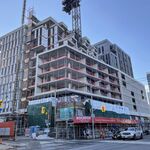Undead
Senior Member
A pox on both their houses?
Hit "Like" for flagging this - thank you @Northern Light.
For the 6-11s item, I'm less enthused at their 'support'. First, it's quite wishy washy ("Support is subject to municipalities being able to implement reflecting local conditions...") Sounds suspiciously like ye old "neighbourhood character" qualification to me. Also, 6s with Toronto's mid-rise guidelines, setbacks and (potentially) heritage rules probably puts plenty of sites into the "does not pencil" category.
I also have to shake my head at the tower floor plates business - it's really a weird hill to die on: over-prioritize the needs of people outside vs those actually living in the building. I feel like there's need for some give-and-take there.
Separately, I'm amused at Planning's exhortation that they're working hard on the PMTSA front. I remember quite a few having density targets that barely exceed the provincial minimums (laughable, given that they're on incredibly expensive transportation infrastructure), and Planning/Council seems determined to avoid any density along the Bloor-Danforth line. (That mass hertitage listing was egregious).
I have no faith that we'll see any ambition wrt. MTSAs. I'm OK with the Province telling the city that they don't get to call the shots there anymore.
You're really hard on City Planning.
I completely agree. Maybe I'm dense but the excerpts @Northern Light was kind enough to share read as the city saying "No" to a bunch of policies that would do good for young people, future citizens, and the health of the city. I'm quite pessimistic about our current planning regime.I'd like to see some acknowledgement that this is a crisis for young people, and speed to action.
Maybe?I completely agree. Maybe I'm dense but the excerpts @Northern Light was kind enough to share read as the city saying "No" to a bunch of policies that would do good for young people, future citizens, and the health of the city. I'm quite pessimistic about our current planning regime.
Out of the province's hands.Maybe?
When I read the Provincial report, I see a lot of potentially good ideas that we will commit to doing that will help developers reduce costs.
But there is nothing here that holds developers accountable for reducing their prices in anyway whatsoever.
The report is missing one huge factor in this crisis - demand. Demand that is largely driven by low interest rates
There's the tax, which didn't do anything. I can't see a way to reduce domestic demand without draconian laws though, so ...and property investment.
I would support a stronger homebuyer rights law, and whatever other people can come up with.That has a huge effect on housing affordability.
Why would developers sell their properties for less than they are getting now? If we reduce their costs, will they commit to that?
Of course it didn't. The investors are not all foreign, after all.There's the tax, which didn't do anything. I can't see a way to reduce domestic demand without draconian laws though, so ...
Out of the province's hands.
There's the tax, which didn't do anything. I can't see a way to reduce domestic demand without draconian laws though, so ...
This would be incredibly unpopular, punitive and would have significant negative effects on labour mobility. Imagine having half the value of your home taxed away every time you move. This would create massive incentives for all housing to be owned by landlords.Capital gains are taxable the same as regular income; and there is no principal residence exemption.
I would bet on that stifling demand.
This would be incredibly unpopular
punitive
Imagine having half the value of your home taxed away every time you move.
This would create massive incentives for all housing to be owned by landlords.




